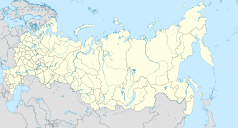Hotel Lux
 Kamienica Filipowa przy Twerskiej. Hotel zajmował lewą część budynku. | |
| Państwo | |
|---|---|
| Miejscowość | |
| Data otwarcia | 1911 |
| 55°45′47,39″N 37°36′31,44″E/55,763163 37,608732 | |
Hotel Lux ros. Люксъ – hotel w centrum Moskwy, będący nieoficjalną siedzibą Kominternu. Został zbudowany w 1911 roku przez z inicjatywy moskiewskiego piekarza Iwana Filipowa. Pierwotną nazwą był Hotel Francja. Znajdował się przy ulicy Twerskiej 36. Po rewolucji bolszewickiej hotel znacjonalizowano i zmieniono nazwę na Lux (Люксъ).
Budynek został przeznaczony na stałe mieszkania dla komunistów-funkcjonariuszy powstałego w 1919 Kominternu i gości Międzynarodówki. W 1933 dobudowano dwa kolejne piętra, co powiększyło hotel do 300 pokoi, zmieniono też adres na: Gorkiego 10. W okresie wielkiej czystki wielu mieszkańców hotelu zostało aresztowanych przez NKWD i zamordowanych.
Hotel Lux istniał do 1953 roku, gdy utracił swój polityczny charakter i został przekształcony w standardowy hotel, przy zmianie nazwy na Hotel Centralny.
Hotelowi został poświęcony niemiecki film fabularny z 2011 roku Hotel Lux w reżyserii Leandera Haußmanna[1].
Mieszkańcami hotelu byli m.in.: Saul Amsterdam, Johannes Becher, Bolesław Bierut, Willi Bredel, Georgi Dymitrow, Hugo Eberlein, Zhou Enlai, Ruth Fischer, Klement Gottwald, Antonio Gramsci, Antonio Graziadei, Gyula Háy, Maksymilian Horwitz (tu aresztowany), Jules Humbert-Droz, Lotte Kühn, Aino Kuusinen, Otto Kuusinen, Wolfgang Leonhard, Ruth von Mayenburg, Hồ Chí Minh, Imre Nagy, Heinz Neumann, Margarete Buber-Neumann, Wilhelm Pieck, Theodor Plievier, Hermann Remmele, Karl Retzlaw, Ernst Reuter, Kang Sheng, Rudolf Slánský, Richard Sorge, Ernst Thälmann, Josip Broz Tito, Palmiro Togliatti, Walter Ulbricht, Gustav von Wangenheim, Herbert Wehner, Erich Weinert, Markus Wolf, Roman Zambrowski, Clara Zetkin, Hedda Zinner.
Przypisy
- ↑ Hotel Lux (2011) - Filmweb, www.filmweb.pl [dostęp 2017-11-18] (pol.).
Bibliografia, linki
- Bert Hoppe, Zimmerservice für die Revolution. Ein Besuch im Moskauer Hotel Lux, das bald zugrunde saniert wird Süddeutsche Zeitung, (October 26, 2007).
- Ruth von Mayenburg, Hotel Lux. Mit Dimitroff, Ernst Fischer, Ho Tschi Minh, Pieck, Rakosi, Slansky, Dr. Sorge, Tito, Togliatti, Tschou En-lai, Ulbricht und Wehner im Moskauer Quartier der Kommunistischen Internationale. Bertelsmann Verlag. Munich (1978) .
- Ruth von Mayenburg, Hotel Lux. Das Absteigequartier der Weltrevolution. 1979. ISBN 3-492-11355-9 Piper Verlag GmbH (1991).
- Ruth von Mayenburg, Hotel Lux – die Menschenfalle. Elisabeth Sandmann Verlag GmbH (2011) ISBN 3-938045-60-4.
- Reinhard Müller, Herbert Wehner – Moskau 1937 Hamburger Edition, 2004, ISBN 3-930908-82-4.
- Reinhard Müller, Menschenfalle Moskau. Exil und stalinistische Verfolgung. Hamburger Edition, Hamburg (2001) ISBN 3-930908-71-9.
- Waltraut Schälike, Ich wollte keine Deutsche sein. Berlin-Wedding – Hotel Lux Dietz Verlag (2006).
- Arkadi Vaksberg, Hôtel Lux. Les Partis frères au service de l'Internationale communiste. Fayard (1993) ISBN 2-213-03151-7.
- Herbert Wehner: Zeugnis – Persönliche Notizen 1929–1942. Bastei-Lübbe (1982) ISBN 3-404-65064-6
- Peter Dittmar, Der steinerne Zeuge des stalinistischen Terrors, Die Welt, 30.10.2007
Media użyte na tej stronie
Autor: Uwe Dedering, Licencja: CC BY-SA 3.0
Location map of Russia.
EquiDistantConicProjection : Central parallel :
* N: 54.0° N
Central meridian :
* E: 100.0° E
Standard parallels:
* 1: 49.0° N * 2: 59.0° N
Made with Natural Earth. Free vector and raster map data @ naturalearthdata.com.
Because the southern Kuril islands are claimed by Russia and Japan, they are shown as disputed. For more information about this see: en:Kuril Islands dispute. These islands are since 1945 under the jurisdiction of the Russian Federation.
Autor: MartinPUTZ, Licencja: CC BY-SA 3.0
The famous Hotel Luxe (Люксъ) building in Tverskaya ulitsa, Moscow, under renovation
Главная булочная Филиппова на Тверской





